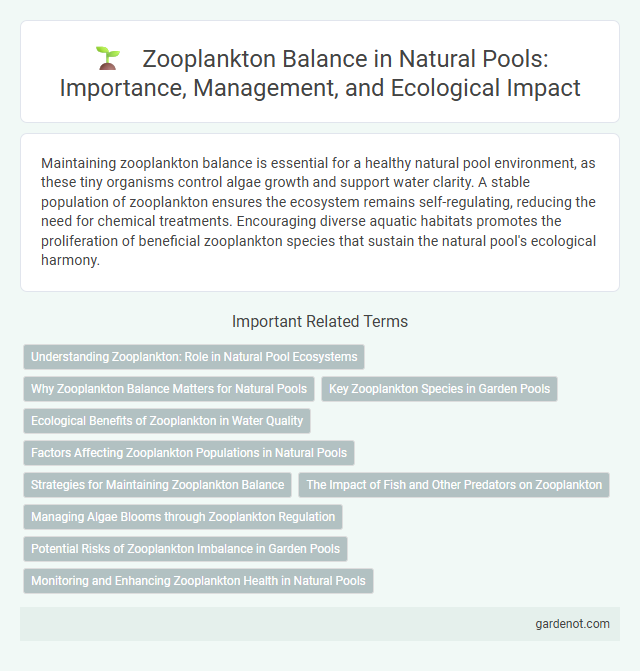Maintaining zooplankton balance is essential for a healthy natural pool environment, as these tiny organisms control algae growth and support water clarity. A stable population of zooplankton ensures the ecosystem remains self-regulating, reducing the need for chemical treatments. Encouraging diverse aquatic habitats promotes the proliferation of beneficial zooplankton species that sustain the natural pool's ecological harmony.
Understanding Zooplankton: Role in Natural Pool Ecosystems
Zooplankton play a critical role in natural pool ecosystems by maintaining a balanced aquatic food web; they consume algae and organic matter, preventing excessive algal blooms that can disrupt water quality. These microscopic organisms serve as a primary food source for small aquatic fauna, supporting biodiversity and ecosystem stability. Effective management of zooplankton populations ensures a healthy, self-regulating natural pool environment with clear water and balanced nutrient cycles.
Why Zooplankton Balance Matters for Natural Pools
Zooplankton balance is crucial for natural pools as they regulate algae growth by consuming phytoplankton, maintaining water clarity and preventing harmful algal blooms. A healthy zooplankton population supports a stable ecosystem, promoting biodiversity and enhancing water quality. Disruption in this balance can lead to excessive nutrient accumulation and deteriorate the pool's natural filtration process.
Key Zooplankton Species in Garden Pools
Key zooplankton species in garden natural pools include Daphnia, Cyclops, and Bosmina, which play crucial roles in maintaining water clarity and nutrient cycling. Daphnia, as major grazers of algae, help control algal blooms and support a balanced ecosystem. Cyclops and Bosmina contribute to the food web by preying on smaller microorganisms and serving as prey for larger aquatic species, ensuring ecological stability.
Ecological Benefits of Zooplankton in Water Quality
Zooplankton play a crucial role in maintaining natural pool ecosystems by regulating algae populations and preventing harmful algal blooms. Their grazing activities enhance water clarity and support nutrient cycling, contributing to a balanced aquatic environment. This ecological balance promotes healthier biodiversity and sustainable water quality in natural pools.
Factors Affecting Zooplankton Populations in Natural Pools
Zooplankton populations in natural pools are influenced by factors such as water temperature, nutrient availability, and predation pressure from fish and other aquatic organisms. Seasonal changes can alter food supply and habitat conditions, affecting reproduction and survival rates. Maintaining optimal water quality and biodiversity helps sustain a balanced zooplankton community essential for ecosystem stability.
Strategies for Maintaining Zooplankton Balance
Maintaining zooplankton balance in natural pools requires monitoring nutrient levels to prevent algal blooms that disrupt aquatic ecosystems. Introducing native plant species helps create habitats that support diverse zooplankton populations, promoting ecological stability. Managing water circulation and avoiding chemical pollutants further ensures a balanced zooplankton community essential for natural pool health.
The Impact of Fish and Other Predators on Zooplankton
Fish and other predators significantly influence zooplankton populations in natural pools by regulating their abundance and species composition. Predatory pressure from fish reduces large zooplankton species, which can lead to increased algal growth due to decreased grazing. Maintaining a balanced predator-prey dynamic is essential for preserving water clarity and the overall health of natural pool ecosystems.
Managing Algae Blooms through Zooplankton Regulation
Zooplankton play a critical role in maintaining natural pool ecosystems by controlling algae populations through their grazing activities. Effective management of zooplankton balance prevents excessive algae blooms, which can otherwise disrupt water clarity and oxygen levels. Maintaining a diverse and stable zooplankton community ensures natural algae regulation, promoting a healthy and self-sustaining aquatic environment.
Potential Risks of Zooplankton Imbalance in Garden Pools
Zooplankton imbalance in garden pools can lead to excessive algae growth and water quality deterioration, disrupting the natural filtration process. An overabundance of zooplankton results in the depletion of beneficial microorganisms, reducing biodiversity and harming aquatic plant life. Maintaining a balanced zooplankton population is essential to prevent the accumulation of organic debris and ensure a healthy, sustainable ecosystem in natural pools.
Monitoring and Enhancing Zooplankton Health in Natural Pools
Regular monitoring of zooplankton populations in natural pools involves using plankton nets and microscopy to assess species diversity and abundance, ensuring ecological balance. Enhancing zooplankton health can be achieved by maintaining optimal water quality parameters, such as stable pH and nutrient levels, and minimizing chemical pollutants that disrupt their lifecycle. Introducing native aquatic plants promotes habitat complexity, supporting zooplankton reproduction and providing a food source for higher trophic levels.
Zooplankton balance Infographic

 gardenot.com
gardenot.com